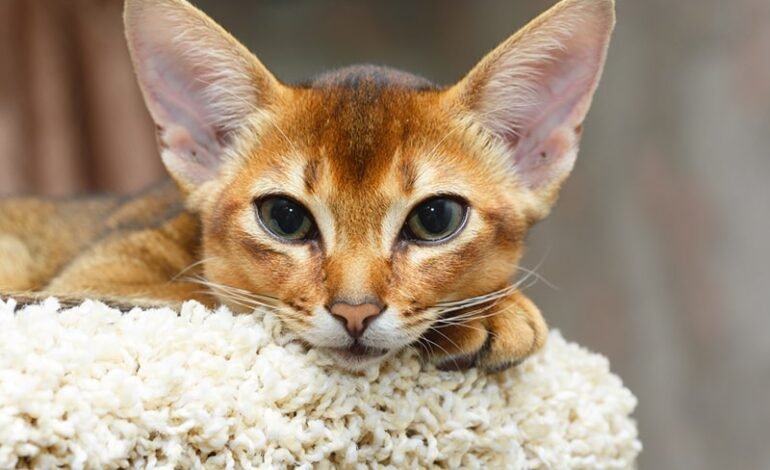How to Care for Your Abyssinian Cat

Abyssinian cats are a beautiful, lively, and affectionate breed, known for their playful nature and striking appearance. They are a wonderful addition to many homes due to their sociable temperament and easy-to-maintain coat. However, like any pet, Abyssinians require proper care to ensure they live a long, healthy, and happy life. In this article, we will explore how to best care for your Abyssinian cat, covering aspects such as their temperament, lifespan, and the costs of owning one.
Abyssinian Cat Temperament: Active and Affectionate
Abyssinian cats are famous for their energetic and curious temperament. They are highly intelligent and require both physical and mental stimulation to stay happy. These cats enjoy exploring their surroundings, climbing, and playing, so it’s important to provide them with plenty of opportunities to exercise and engage with you.
One of the most distinctive traits of Abyssinians is their love of human company. Unlike some other cats that prefer to be alone, Abyssinians are often very social and affectionate with their owners. They are known to follow their humans around the house, greeting them at the door and wanting to be involved in daily activities. If you’re looking for a cat that enjoys being around people but doesn’t demand constant attention, the Abyssinian cat temperament might be a perfect match.
Abyssinians can also get along well with other pets, including dogs and other cats, provided they are introduced properly. Their friendly nature makes them ideal for families with multiple pets or those who want a cat that enjoys being a part of a busy household. However, because of their playful and energetic personality, they may not always enjoy being left alone for long periods of time. If you work long hours, it may be a good idea to have another pet around to keep your Abyssinian company.
Abyssinian Cat Lifespan: How Long Can You Expect Your Cat to Live?
The Abyssinian cat lifespan typically ranges from 12 to 16 years, though with proper care, some cats may live even longer. This breed tends to be relatively healthy, but, like all cats, Abyssinians are susceptible to certain genetic health issues. Keeping up with regular vet check-ups and maintaining a healthy lifestyle for your cat will help ensure they live a long and healthy life.
One of the most important aspects of ensuring a long life for your Abyssinian is providing a proper diet. Feeding them high-quality, well-balanced food is key to supporting their overall health. Additionally, regular exercise is important to keep your Abyssinian in good physical condition, as they are an active breed. A mix of playtime and interactive toys will help your cat burn off excess energy, preventing obesity and other health issues.
Although Abyssinians are generally healthy, there are a few conditions that are more common in this breed. Some Abyssinians may be prone to dental issues, so regular teeth cleaning and check-ups with the vet are recommended. Additionally, they may be at risk for a few genetic disorders, such as kidney disease or hip dysplasia, which can affect their quality of life if not managed properly. Regular veterinary visits will help catch any potential problems early on, ensuring your cat enjoys the best health possible throughout their lifespan.
Abyssinian Cats: Grooming and Coat Care
One of the advantages of owning an Abyssinian cat is that their grooming needs are relatively low compared to other long-haired breeds. Abyssinians have short, dense coats that are not prone to matting or tangling. While their coat doesn’t require as much maintenance as that of a Persian or Maine Coon, it’s still important to brush them occasionally to remove loose hair and keep their coat looking healthy.
Because Abyssinians are such active cats, they can sometimes get dirt or debris in their fur from their explorations. Giving them a light brushing every week or so can help prevent hairballs and keep their coat shiny. It’s also a good idea to check their ears and trim their nails regularly. Keeping your Abyssinian’s grooming routine consistent will ensure they stay comfortable and clean.
Abyssinian cats are also known for their unique coat coloration. The fur of an Abyssinian has a “ticked” pattern, where each individual hair is banded with multiple colors. This gives them a wild, exotic appearance. The coat colors of Abyssinian cats vary, ranging from ruddy, sorrel, blue, and fawn, all of which contribute to their striking looks. The coat requires minimal care, but it’s important to pay attention to their skin health, as any irritation or dryness could impact their appearance and comfort.
Abyssinian Cat Cost: What to Expect
When considering adding an Abyssinian cat to your home, it’s important to factor in the cost of owning one. The price of an Abyssinian cat can vary widely, depending on factors such as their age, pedigree, and where you purchase them. On average, you can expect to pay between $500 and $1,500 for a purebred Abyssinian from a reputable breeder. The cost can be higher for show-quality cats or those with champion bloodlines.
In addition to the initial cost of the cat, there are ongoing expenses to consider. Like all pets, Abyssinians will require regular veterinary care, including vaccinations, flea treatments, and health check-ups. On top of that, you’ll need to provide them with food, litter, toys, and other supplies. These ongoing costs can add up over time, so it’s important to be prepared for the financial commitment involved in caring for your Abyssinian cat.
If you’re on a budget but still want an Abyssinian cat, consider adopting from a rescue organization or shelter. Many Abyssinians and other purebred cats end up in rescues, and adopting from a shelter can be a more affordable option. Not only will you be providing a loving home for a cat in need, but you may also save money on the initial cost of purchasing a cat from a breeder.
How to Keep Your Abyssinian Cat Happy and Healthy
Abyssinians are active, social, and intelligent cats, so providing an environment where they can thrive is key to ensuring they remain healthy and happy. Here are a few tips to help care for your Abyssinian cat:
- Exercise and Play: Abyssinians are known for their boundless energy. Make sure to provide them with plenty of opportunities to play and exercise. Interactive toys, climbing structures, and even cat trees will keep them physically and mentally stimulated.
- Healthy Diet: A high-quality, balanced diet is important for the overall health of your Abyssinian. Make sure to feed them a mix of wet and dry food and keep their weight in check. Cats are often good at self-regulating their food intake, but it’s still important to monitor their diet to ensure they maintain a healthy weight.
- Social Interaction: Abyssinians thrive on social interaction. Spend time with your cat each day to reinforce your bond. They enjoy being part of family activities and can even be trained to perform tricks or walk on a leash.
- Veterinary Care: Regular vet visits are important to monitor the health of your Abyssinian. Make sure to stay up-to-date on vaccinations, flea treatments, and other preventative care measures. Early detection of any health issues can help ensure your cat lives a long, healthy life.
- Grooming: While Abyssinians don’t require as much grooming as long-haired breeds, regular brushing can help keep their coat looking great and prevent hairballs. Pay attention to their ears, eyes, and nails as well.
Abyssinian cats are a wonderful breed for those looking for a lively, affectionate, and easy-to-care-for pet. Their playful nature and striking appearance make them a great choice for families and individuals alike. However, as with any pet, owning an Abyssinian comes with responsibilities. Understanding their temperament, lifespan, grooming needs, and costs can help ensure a long and happy life for your Abyssinian cat. By providing the proper care and attention, you can enjoy a loving and active companion for many years to come.










